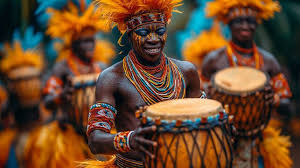Once considered a niche genre in international circles, African music is now a global force. Whether it’s Burna Boy rocking the Grammys, Tems topping charts, or Amapiano beats taking over TikTok, the world can’t get enough of Africa’s sound.
But this is more than a trend. It’s a movement rooted in culture, rhythm, language, and identity. African music isn’t just being heard—it’s being embraced, celebrated, and reshaping the global music scene.
In this article, we’ll explore how African artists are breaking barriers, how genres like Afrobeats and Amapiano are conquering continents, and why this musical revolution is just getting started.
The Sound of the Continent
Africa is not a monolith—and neither is its music.
From the soulful rhythms of Mali, to the guitar-led rumba of Congo, the pulsing beats of Nigerian Afrobeats, and the bouncy vibe of South Africa’s Amapiano, each region contributes something unique to the sonic palette.
Here are just a few popular genres:
-
Afrobeats – Nigeria’s gift to the world, blending hip hop, dancehall, highlife, and African percussion.
-
Amapiano – South Africa’s deep house genre, known for its piano chords and chill vibes.
-
Bongo Flava – Tanzania’s hip-hop-meets-dance music with Swahili lyrics.
-
Gqom – A darker, bass-heavy electronic sound from Durban.
-
Zouglou – From Côte d’Ivoire, often dance-driven and socially conscious.
This diversity is part of what’s made African music irresistible to global ears.
Afrobeats: The Breakthrough Sound
The rise of Afrobeats over the last decade has been nothing short of phenomenal.
Pioneers like Wizkid, Burna Boy, Flavour, Davido, Tekno and Tiwa Savage have transformed from local superstars to international icons. They’ve performed on the world’s biggest stages, collaborated with global names like Drake, Beyoncé, and Ed Sheeran, and brought African languages and rhythms to new audiences.
Afrobeats has become:
-
A staple at music festivals.
-
A frequent guest on Billboard charts.
-
A soundtrack for nightlife from Lagos to London to Los Angeles.
What makes Afrobeats so powerful? Its infectious rhythm, its feel-good energy, and its cultural confidence. It’s music that doesn’t try to fit into global standards—it sets its own.
Amapiano: South Africa’s Viral Sound
While Afrobeats was taking over the clubs, Amapiano was quietly brewing in South Africa’s townships—until it exploded into a global online phenomenon.
Artists like Kabza De Small, Uncle Waffles, DJ Maphorisa, and Focalistic have helped put Amapiano on the map, with its hypnotic basslines, soft synths, and danceable groove.
What pushed Amapiano beyond borders?
-
TikTok trends and viral dance challenges.
-
Remixes by international DJs.
-
Cross-border collaborations with Afrobeats, house, and EDM artists.
In 2025, Amapiano isn’t just a South African thing—it’s a worldwide vibe.
African Women Are Leading Too
One of the most exciting shifts is the rise of female African artists taking center stage.
From Tems, who co-wrote with Beyoncé and earned her own Grammy, to Ayra Starr, Sho Madjozi, and Yemi Alade, African women are pushing the boundaries of sound, fashion, and storytelling.
They bring vocal power, cultural pride, and a fresh perspective that’s long been missing in mainstream African music. Their visibility is inspiring a new generation of girls to dream bigger—and sing louder.
The Diaspora Connection
The African music wave isn’t just fueled by artists on the continent—it’s amplified by the African diaspora.
Artists like:
-
J Hus (UK) – Blending Afrobeat and grime.
-
Amaarae (Ghana/US) – Experimenting with futuristic sounds and gender expression.
-
Burna Boy and Tems, who split time between Africa and the West.
Diaspora artists act as bridges—connecting African roots with global platforms. Their influence has helped open doors, challenge stereotypes, and make African music feel familiar yet fresh to international audiences.
Streaming Platforms and Social Media
Another key to African music’s rise? Technology.
Thanks to platforms like Spotify, Apple Music, YouTube, Audiomack, and Boomplay, African artists can now reach a global audience without needing a Western label.
Social media has also leveled the playing field:
-
Viral dance trends on TikTok.
-
Freestyles and acoustic sessions on Instagram.
-
Music premieres on YouTube Live.
Fans don’t need radio stations to hear new songs anymore—and that’s helping African music spread organically and faster than ever.
Awards, Recognition, and Respect
For a long time, African music was boxed into the “world music” category, often overlooked at global awards. But things are changing.
In recent years:
-
Burna Boy won a Grammy.
-
Wizkid’s “Essence” became a global summer anthem.
- Ckay’s Love Nwantiti became a global hit
- Rema’s Calm Down got feature from Selena Gomez
- Tems earned features on Drake, Future, and Black Panther soundtracks.
-
The Grammys introduced an African Music category for 2024.
This recognition isn’t just about validation—it’s about making space for African voices to be celebrated on their own terms.
What This Means for Africa
The global success of African music has ripple effects far beyond entertainment:
-
Economic impact: Music exports are becoming a real source of income and jobs.
-
Tourism: Music festivals like Afro Nation, Unboxed Party, GidiFest, Jeriq Hood and Cape Town Jazz Festival attract global audiences.
-
Cultural pride: African youth feel more connected to their heritage and confident in their identity.
-
Soft power: African music is changing how the world sees the continent—not as a place of struggle, but of joy, talent, and creativity.
What’s Next?
The future is bright for African music. Here’s what we expect next:
-
More cross-genre collaborations between African and Western artists.
-
A rise in independent labels and local music tech startups.
-
Expansion into virtual reality concerts and NFTs.
-
Growth of regional genres like Benga (Kenya), Taarab (Tanzania), and Coupe Decalé (Ivory Coast).
And most importantly, more young artists telling their own stories in their own languages, proudly rooted in their cultures.
African music isn’t just trending—it’s transforming.
It’s dancing through headphones in Tokyo, blasting in taxis in New York, and headlining festivals in Europe. It’s showing the world what Africa sounds like—bold, rhythmic, proud, and unstoppable.
At Afriker.com, we celebrate the artists, producers, dancers, and fans who are turning up the volume on Africa’s voice. Because this music isn’t just heard—it’s felt, lived, and loved.
And guess what? The best is yet to come.

